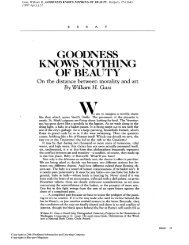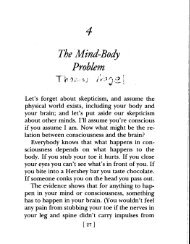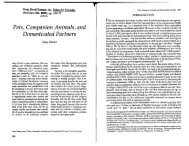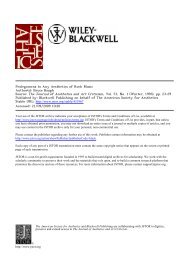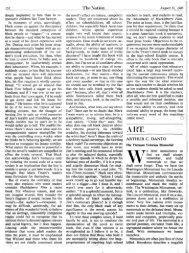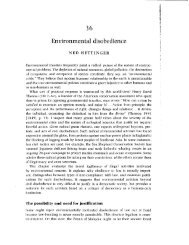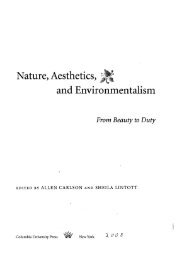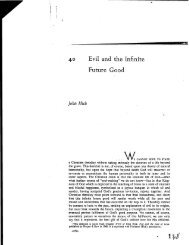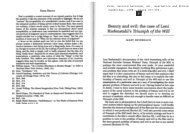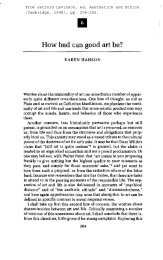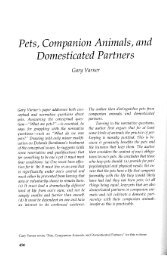48 Nathan Nobissuch a kind that they may be the subjects of experiments only with theirvoluntary consent . . . <strong>Animal</strong>s are of such a kind that it is impossible for them,in principle, to give or withhold voluntary consent or make a moral choice.What humans retain when disabled, animals never had [14].Although interesting, these remarks still do not explain why ‘marginal’ humans are ofsuch a rights-conferring kind <strong>and</strong> animals are not. We are not told what it is about themthat determines their kind-memberships. We must, therefore, speculate on what thesereasons might be.6.1. Kinds Depend on What’s ‘Normal’?First, it might be said that (2*) is true because since ‘normal’ human beings (i.e.,adults) are of the kind ‘possesses moral capacities,’ ‘marginal’ humans are also ofthat kind. Roger Scruton might endorse this suggestion when he writes, “Infants <strong>and</strong>imbeciles belong to the same kind as you or me: the kind whose normal instances arealso moral beings” [15].Here ‘normal’ seems to be understood in a statistical sense: if most human beingshave some characteristic, then it’s normal. But this defence of (2*) succeeds only if thisgeneral principle is true: if ‘normal’ human beings are of some kind K, then ‘marginal’humans are of that kind K as well. But this principle seems clearly false: ‘normal’human beings are of the kinds ‘able to make pasta’, ‘able to reproduce’, <strong>and</strong> ‘able tosolve maths problems <strong>and</strong> drive cars’ but ‘marginal’ humans can do none of these: theyare not of the kind ‘pasta-maker’ or ‘equation solver.’ Most ‘normal’ human beings arealso of the kind ‘over four feet fall’, but most ‘marginal’ humans (i.e., infants) are quiteshort: they are not of that kind.Thus, in general, that fact that it is normal for some humans to be of some kind (orhave some property) does not entail that non-normal humans are also of that kind (orhave that property). So these considerations provide no straightforward reason to thinkthat humans who are statistically abnormal have the capacity for moral judgment or areof that kind [16].6.2. Kinds Depend on What’s ‘Natural’?Similar responses would also be directed to the charge that since it’s ‘natural’ forhumans to have some specific capacities or abilities, ‘marginal’ humans have them aswell <strong>and</strong> so are of the corresponding kind. (Below we will see that Cohen uses the term‘natural’, perhaps to suggest just this).While the meaning of ‘natural’ is often obscure, this principle is refuted by the factthat although it’s ‘natural’ for humans to have two arms <strong>and</strong> IQ scores greater than 90,obviously, there are humans without two arms or with quite low IQ scores. Thesehumans are, of course, of the kind ‘human,’ but they are obviously not of the kinds‘having two arms’ or ‘having average IQ.’ So the fact that some characteristic is‘natural’ does not entail that all humans (including ‘marginal’ humans) have it. Soappeals to what’s ‘natural’ again provide no reason to think that marginal humans areof the kind ‘possess moral capacities.’© Society for Applied Philosophy, 2004
6.3. Kinds Depend on ‘Potentials’ <strong>and</strong> Logical Possibilities?<strong>Carl</strong> Cohen’s ‘Kind’ <strong>Arguments</strong> 49A third suggestion for thinking that ‘marginal’ humans are of a kind that possesses thecapacity for moral judgment is to (apparently) disagree with Cohen <strong>and</strong> argue that‘marginal’ humans do, in fact, possess the capacity for moral judgment <strong>and</strong>, therefore,they are of that ‘kind.’ It might be said that they have this capacity because they arepotential moral agents, or could be moral agents, <strong>and</strong> so are of that kind. This responsehas some initial plausibility, perhaps, since there are unrealized capacities, i.e., abilitiesthat are never exercised: maybe even though ‘marginal’ humans do not make moraljudgments, in some sense they could, so they are of that kind.This response is problematic in many ways: first, given moral principle (1*), itimplies that human fetuses are also of that kind, so all abortions violate their rights,as does any ‘terminal’ experimentation on human cells or tissues that could becomemoral agents. This would include not just fertilized eggs <strong>and</strong> (frozen or fresh) embryos,but any other (human or non-human) cells that could be cultivated into moral agentswere certain technologies (eventually) applied to them. It also might imply that contraception<strong>and</strong> even abstinence violate rights if, like a table-<strong>and</strong>-set-of-chairs canbe considered one thing, an egg-<strong>and</strong>-a-sperm-that-could-fertilize-it is one thing as well,since that sum of those parts has the potential to become a moral agent (as it oftendoes). If this case against animal rights entails that all abortions, contraception, <strong>and</strong>all other activities that prevent potential moral agents from existing violate rights,then at least some of these consequences might rightly be seen as a reductio of thisresponse.Second, this response doesn’t seem to cover all actual ‘marginal’ humans since, forsome who are very seriously damaged or incapacitated, a medical professional mighttruly judge (<strong>and</strong> Cohen would agree) that they even lack the potential to become moralagents since, given their biological condition, that is medically impossible for them:in their lives they will never make moral judgments. One might respond, however,that there is a broader sense of ‘potential’ that applies to these humans. Alan Whitesuggests this response; he says that ‘marginal’ humans “may be for various reasonsempirically unable to fulfil the full role of a rights-holder. But . . . they are logicallypossible subjects of rights to whom the full language of rights can significantly, howeverfalsely, be used” [17]. While advocates of ‘marginal’ humans do not want to agree thatthese rights ascriptions are false, if the suggestion is that since it’s logically possible forthese humans to be moral agents, they are of that kind <strong>and</strong> thereby have rights, thensince it’s also logically possible for animals to be moral agents (i.e., that’s not formallycontradictory), then animals are of that kind <strong>and</strong> have rights as well. So I presume thatthe foe of animal rights does not endorse this defence of (2*).Finally, it’s not at all clear what motivates this response anyway. Although it doesn’tseem to presume the false principle ‘if something potentially or could have property P,then it has property P now’, it’s not clear how it works. Some moral agents are massmurderers: does that mean that all ‘marginal’ humans are potential mass murderers <strong>and</strong>so are of the kind ‘mass murderer’? Some are firefighters: are all humans thereby of thekind ‘firefighter’? Or does this response apply only to ‘normal’ or ‘natural’ characteristic<strong>and</strong> so only these are ones that ‘marginal’ humans have as ‘potentials’? If so, thenthis response seems subject to the objection above. Either way, given this response’s© Society for Applied Philosophy, 2004



